Law crosses cultural lines in Fribourg
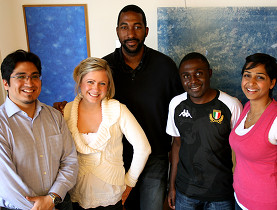
How many lawyers does it take to teach a Master of Laws in Cross-Cultural Business Practice? At Fribourg University in western Switzerland the answer is 53.
The instructors, who represent 12 different nationalities, are taking part in the first year of an English-language course designed to compete with prestigious postgraduate masters in the United States.
Law and culture tend not to pop up in the same sentence but the architects of this course argue that legal systems reflect and define the culture from which they emerge.
“We realised that law is not just a matter of black letter rules [general and accepted legal principles] but a question of diversity of language and cultural origins,” one of five programme directors Pascal Pichonnaz told swissinfo.ch.
In addition to law, the programme – a joint venture between the universities of Fribourg, Bern and Neuchâtel – includes instruction on aspects of ethics, sociology, psychology and anthropology.
The 12 students enrolled for two full-time semesters, come from 11 countries, including Australia, Peru, China, the US, Turkey, Canada and Cameroon.
“These students have their legal background and education and they know their system,” visiting lecturer Carsten Jungmann from Bucerius Law School in Hamburg told swissinfo.ch.
“It’s not too complicated if you have this foundation to begin a comparison and that will not only bring you knowledge of other jurisdictions but will also give you insight into your own,” he added.
Back to school
Not having anything better to do on a Tuesday morning, this reporter sat in on a corporate law and governance lecture given by Jungmann and his colleague Karsten Schmidt, with some participation from Jeffrey Bauman of Georgetown University.
The students held their nerve against an onslaught of information about German company law, partly shielded by their open laptops. The atmosphere was genial, if a little weary as the students had agreed to work through their morning break.
In our discussion afterwards, the students who stayed to chat enthused about the programme, which they felt would add a very distinctive string to their bow in a competitive jobs market.
Network
Salima Samnani from Canada had no doubt she had made the right choice. “We have 53 visiting professors; we’re listening to English, French and German every day and building up this amazing network of people, languages and ideas from around the world,” she said.
Another student, George Walker, with a background in US politics spoke of the importance of “not having knee-jerk reactions to the differences we face”.
“We do come from different backgrounds, we do have different cultures, we approach legal questions differently,” Walker said.
“But one of the focuses of this programme is not to be totally turned off by a different legal system and not to think that because one thing is different, everything is different. And at the same time not to assume that because a few things are the same that most things are the same.”
Red tape
With annual fees of €30,000 (SFr45,539), not including living expenses, this masters programme is priced at the same level as the leading US law schools but cost does not appear to have been an obstacle in recruiting students. The biggest headache for the organisers was red tape.
Several potential students gave up on their plans to come to Switzerland because they could not, despite their best efforts, satisfy the sometimes oblique requirements of the immigration authorities.
“You expect when you find good students with the financial background as well to be able to get the visa for one year to enter and study here,” Pichonnaz said.
“We were quite surprised for example when a Chinese student with sufficient financial means was refused a visa by the Swiss embassy in Beijing and we don’t know why so it was not even possible for us to help her.”
Pichonnaz’s frustration is clear, all the more so because upon completion graduates are offered six-month paid internships. “It’s difficult to set up a truly international programme with international students when you have these administrative obstacles.”
In time, the aim is to increase student numbers to at least 20 to make the programme pay. But it should not grow too large so as to keep the attraction of having a relatively small group.
Switzerland has two federal institutes of technology and ten universities.
In a 2005 breakdown, some 22 per cent of the students at universities were foreigners – three-quarters of them originating from Europe.
The number of foreign students that studied at the first and second study levels (Bachelor, Master, Licentiate/Diploma) was 16 per cent, with a much higher number at doctorate level (43 per cent).
This bilingual university located on the linguistic border between the French- and German-speaking parts of Switzerland has five faculties with study programmes taught in both languages.
With a student body of approximately 10,000, the university has some 200 professors from 110 countries. One in five students comes from abroad.
The Law Faculty with 1,700 students also hosts the Federalism Institute, the European Law Institute, the International Institute of Construction Law and the Economic Law Institute.

In compliance with the JTI standards
More: SWI swissinfo.ch certified by the Journalism Trust Initiative
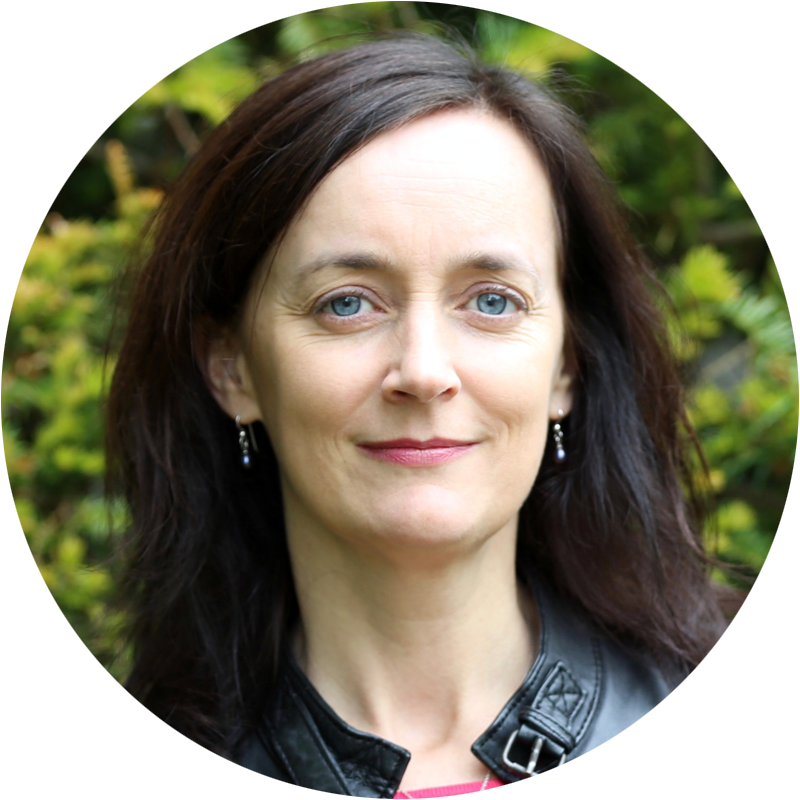
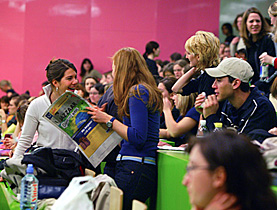
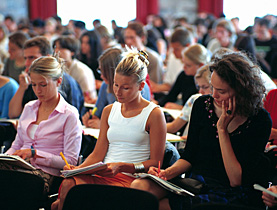
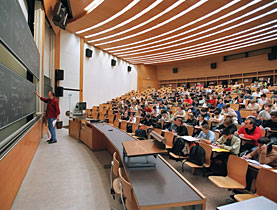

You can find an overview of ongoing debates with our journalists here . Please join us!
If you want to start a conversation about a topic raised in this article or want to report factual errors, email us at english@swissinfo.ch.